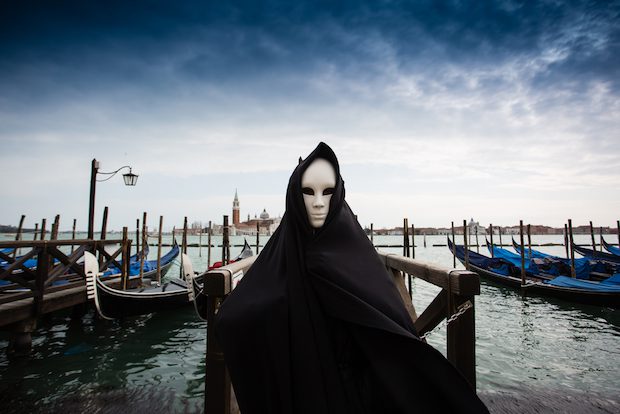Death In Venice

I’ll be in Italy next month for a conference, flying into and out of Venice. I’ve never seen Venice, so I’ve made plans to stay there for a couple of days before heading home. I’m reading a history of the city now, and it’s simply a breathtaking monument to human endeavor that the city exists at all, much less that its people created such a work of art to live in. I anticipate that walking its streets will be one of the highlights of my life.
A friend sent me this short piece from Artnet about the Venice Bienniale, the art world’s most significant event. Excerpts:
The world in 2017 is a frightening and chaotic place: why not relieve your anxiety with some casual masturbation or perhaps some good old-fashioned sex? As a corollary to the heavy menu of post-colonial guilt, migration-related tub-thumping and an abstract, queasy panic induced by global capitalism, this year’s Venice Biennale is letting off steam with an abundance of carnal knowledge. From pagan fertility rituals to extreme genital modification: it’s all here for the taking.
Showing as part of James Richards’s exhibition for the Welsh pavilion, the film What Weakens the Flesh Is the Flesh Itself (a collaboration with Steve Reinke) explores the body as a work of art in itself. Besides a lingering tour through snapshots of cheerful young men hanging out at a festival, and footage from an erotic photo-shoot heavy on the squashed fruit, the film draws extensively on the private photographic archive of Albrecht Becker.
An actor and photographer arrested and imprisoned for homosexuality by the Nazis, Becker became obsessed with representation and modification of the body. Gradually the images shown of this mild-looking elderly man in his V-necked sweaters become more unconventional, revealing a body entirely covered in homemade tattoos and piercings. Fairly close to the top of Venice’s wince list this year comes Becker’s modified and elephantine groin, so swollen that the penis prods out like a little mushroom cap. From a bolt through his glans, he lifts great metal chains.
Sounds like fun, eh? More:
[I]n Shezad Dawood’s Leviathan cycle, the narrator Yasmine masturbates next to the corpse of a woman whose jeans she’s about to purloin.
And:
Pauline Curnier Jardin’s film and installation work Grotta Profunda Approfundita (for this critic, a highlight of the Biennale overall) places its viewers inside the human body, seated on a tufted rug that suggests the wall of a sexual organ. Among the many indelible images on offer is a louche Jesus, oiled and lounging in his loincloth like a 1970s tennis player, tempting a young Saint Bernadette with proclamations of love that sound divine in all the wrong ways. Oh, the ecstasies she suffers! Besides such holy visions, Curnier Jardin makes overt homage to the heavy-bodied and lysergic feminist film works of the 1960s and ’70s, which in themselves offer an essential intersection between sexual, and liberal/activist agendas.
Read the entire review, if you can stand it.
“His mind and his soul were intoxicated, and his steps were dictated by the demon who delights in destroying man’s reason and dignity,” wrote Thomas Mann, in Death In Venice. At this point, is it even worth mustering outrage? Mind you, the Venice Bienniale is not just one art event among many. It is the most prestigious in the world. And this rotting corpse of a show is the very best Western civilization can produce today.
True, none of us will go to the Venice Bienniale, and few of us would want to. But don’t deceive yourself into thinking that this only reveals the depravity of the elites. This is only an aestheticization of what the masses watch to stiffen their giblets in the privacy of their own homes. As Nicolas Gomez Davila put it, “The Gospels and the Communist Manifesto are on the wane; the world’s future lies in the power of Coca-Cola and pornography.”
The contrast between the glories of the past manifest in the great paintings and architecture of historic Venice, contrasted with this filth, this decadence, is a sign of the times. Look what our inheritance is, and look how we have squandered it. We are dead men. We have poisoned ourselves. We are a depraved civilization that deserves judgment.
And we are going to get it.
Subscribe for as little as $5/mo to start commenting on Rod’s blog.